Proof that wallets can be louder than words.
The boycott. It’s a mighty move to enact change.
Whether it’s about environmental harm or ignorant marketing, the reasons for boycotts are as varied as the industries they target.
In this blog, we’ll look at why brand boycotts happen, spotlight some very recent high-profile examples, and why staying ethical equals survival for any business today.
Because let’s face it, people care about more than what brands sell. They care about what they stand for.
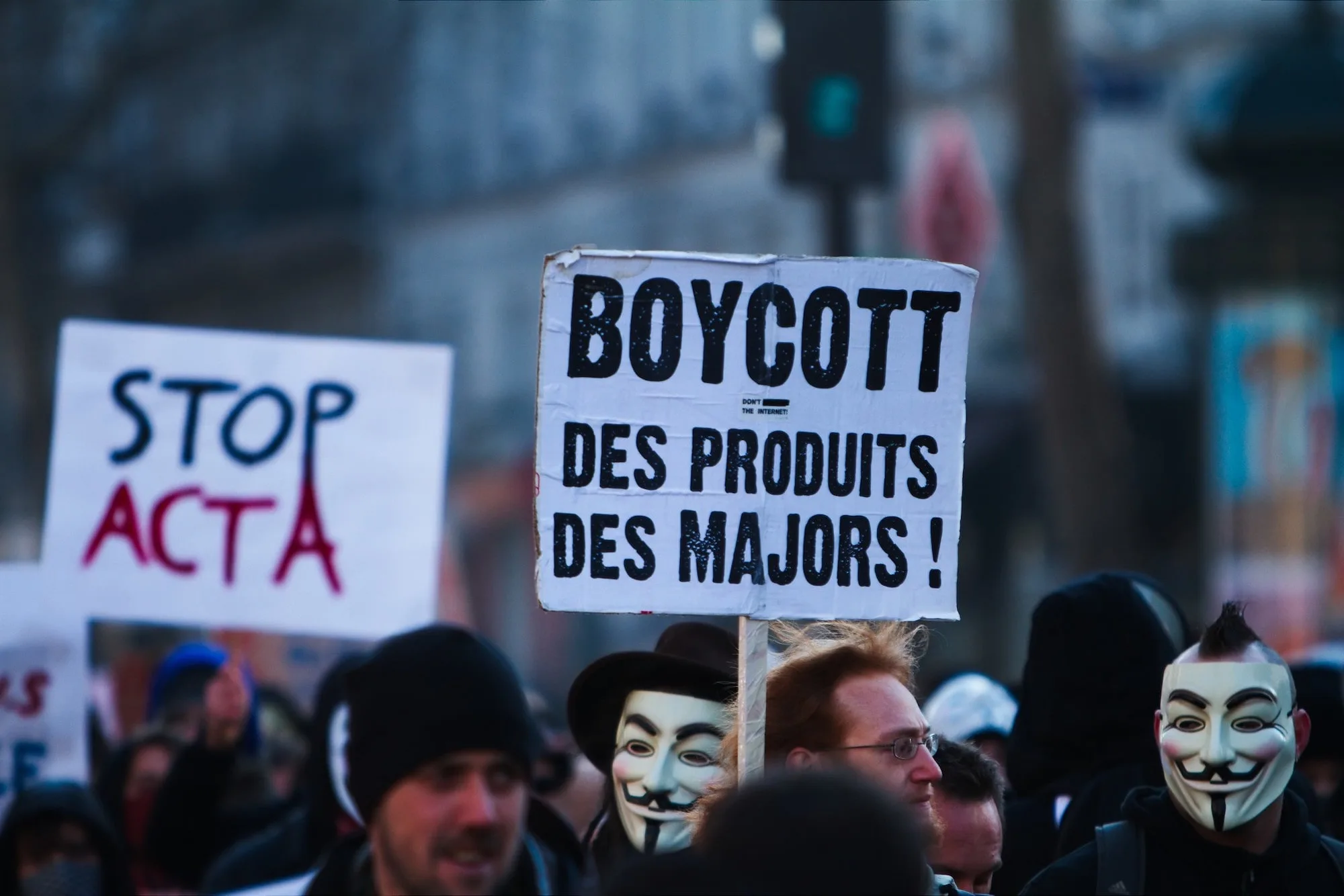
Why brands get boycotted in the first place
Over half of shoppers globally are motivated to either buy from or boycott brands based on alignment with their beliefs. It’s a movement driven by increasing distrust in traditional institutions, and desire for meaning amidst overwhelming consumption.
Here are some of the most common reasons why one consciously stops buying from brands:
- Social missteps: Taking controversial stances – or failing to take one, to begin with – on hot topics like gender equality or inclusivity can alienate large portions of a customer base that prioritises such issues.
- COO: No, not chief operating officer. Rather, country of origin. A whole country, or several, may boycott brands that originate from a nation seen to be on the opposing side of geopolitical conflict.
- Misaligned values: When a brand’s actions go against its publicly-shared principles.
- Environmental irresponsibility: Brands with blatantly harmful practices will get called out by eco-conscious consumers who demand better.
It’s worth noting that not all boycotts are led by consumers, end-users, and the like. Sometimes uprising comes from within a company. Other times, it’s pushback from other businesses, as you’ll read about soon enough.
A few recent cases
On to the more thrilling part. We take a look at some of the recent cases involving brand boycotts.
X
- When: ongoing
- Why: multiple missteps by a plateauing platform
It was one thing when Elon Musk bought the microblogging platform for a whopping US$44 billion. It was another when he rebranded it from Twitter to X – with a rollout that was quite comical, to say the least. Yet, here we are at another significant junction of the X-Musk journey.
This August, X filed a lawsuit against the Global Alliance for Responsible Media (GARM), which featured international players like FMCG giant Unilever, Mars Inc. and CVS Health. Accused of orchestrating an illegal boycott, X claims GARM was pushing advertisers away, trying to portray them as a violation of antitrust laws. The latest updates? X is no longer pursuing Unilever but added Twitch to the list of defendants.
X, however, has lost and continues to lose hundreds of millions of dollars in ad revenue since the October 2022 takeover. To many, the lawsuit looks more like a defensive reaction to its financial woes. Under Musk, X has faced escalating criticism for changes that have amplified hate speech, misinformation, and other harmful content, making it a less appealing space for brands.
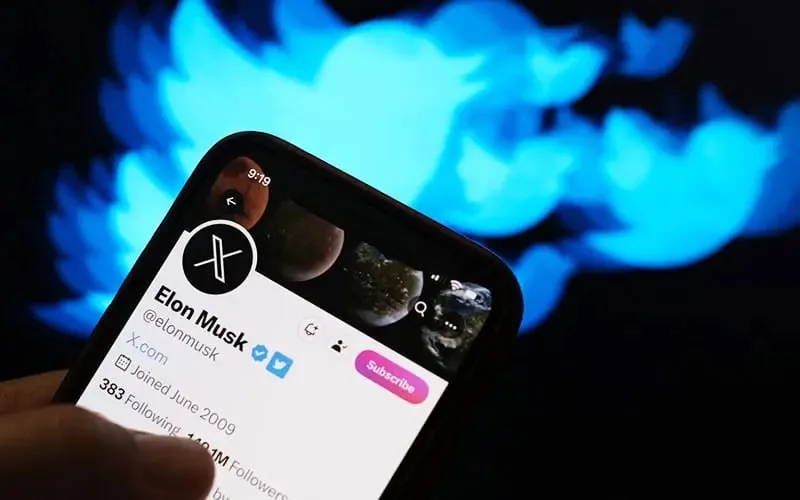
Amazon and The Washington Post
- When: October 2024
- Why: abuse of power and political controversy
The hashtags #BoycottAmazon and #BoycottWapo spread on social media after Jeff Bezos, owner of both Amazon and The Washington Post (WaPo), interfered in the newspaper’s editorial stance. WaPo was ready to publish an endorsement for Democratic candidate Kamala Harris in the final weeks leading up to the US presidential elections. And then, Bezos pulled the plug.
Critics accused the billionaire of undermining journalistic independence to protect his personal or corporate interests, sparking calls for a boycott. The incident highlighted long-standing concerns about the concentration of power and influence in the hands of tech billionaires. Ring any bells?
For years, the company has faced criticism over its labour practices and environmental impact (remember June 2023?). This latest incident only adds fuel to the fire, resulting in cancelled Amazon Prime memberships, cancelled Washington Post subscriptions, and editorial board members’ resignations.
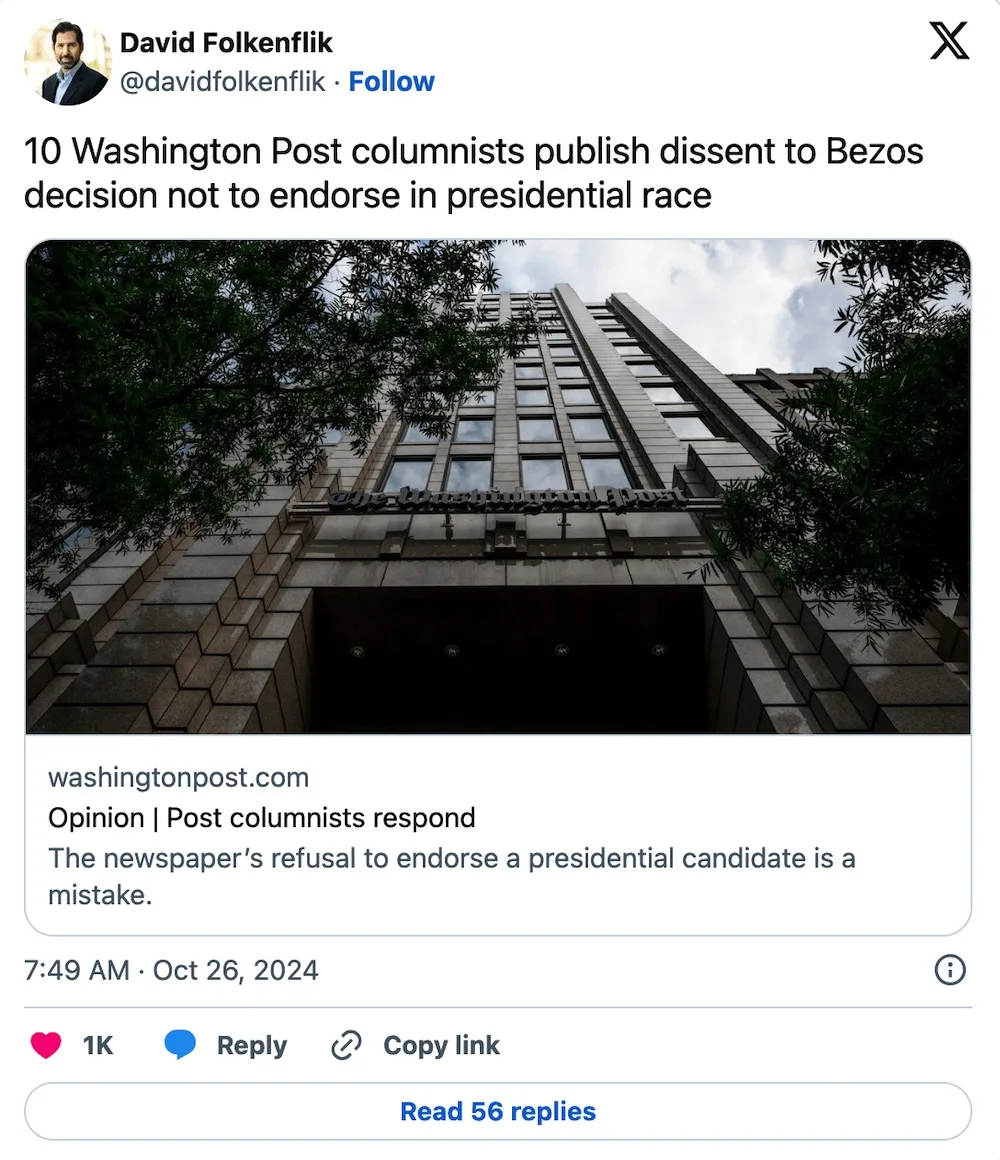
Brewdog
- When: 2024-2026
- Why: a series of unethical actions
Brewdog were trending on X. This time through the hashtag of #BoycottBrewdog – not one of their irreverent marketing campaigns.
The company had fired an Asian woman for voicing unease about customers who were members of the far-right English Defence League (EDL) and were drinking at the London bar she worked at. She explained that she had experienced her family’s racial abuse by the EDL. EDL is known for aggressive anti-Islamic, anti-multicultural ideologies and a history of violent street demonstrations.
The dismissal accelerated an already spiralling reputation of the once progressive but still cool, beer brand. Six months earlier, Brewdog announced the decision to drop real living wages and pay the bare minimum. Why? Because of huge operating losses. They also lost their B-Corp status shortly after the BBC documentary ‘Disclosure: The Truth About Brewdog’ exposed a toxic workplace culture of bullying and exploitation.
The controversies go further back but since the company’s maverick image unfolded a boycott has spread and losses are mounting. After 17 years at the helm, CEO and Co-founder James Watt has finally stepped down – followed by remaining Co-founder Martin Dickie in August 2025. In January 2026 the company announced the closure of its spirits division and a distillery in Aberdeenshire, where it all began.
Can the company survive? With a £36.7 million operating loss in 2024 alongside a slew of bar closures including the flagship Brewdog in Aberdeen, change is vital but it may be too late.

Bumble
- When: May 2024
- Why: a major misalignment of values and tone-deaf marketing
The internet coined it The Great Bumble Fumble.
The dating app found itself in hot water after rolling out a new campaign that missed the mark completely. One of the billboard ads read, “You know full well a vow of celibacy is not the answer.” Everyone called Bumble out for shaming women who choose celibacy – whether for personal beliefs, healing from trauma, navigating a world with limited reproductive rights, or just being tired and wanting to hit pause on the dating scene.
It was only natural that #BoycottBumble became trending. Many pointed out the irony: a company that claims to empower women seemed to be mocking a valid and often empowering choice. To this day, the TikTok maintains its dedicated Discover page on the fiasco.
Bumble quickly issued a statement, pledging to pull the ads. They even promised to make donations to the National Domestic Violence Hotline and other organisations supporting women, giving them the chance to use the billboard space instead. Some praised Bumble for its sincere apology, though others argued that the attempt at humor had marked its reputation among its core audience.
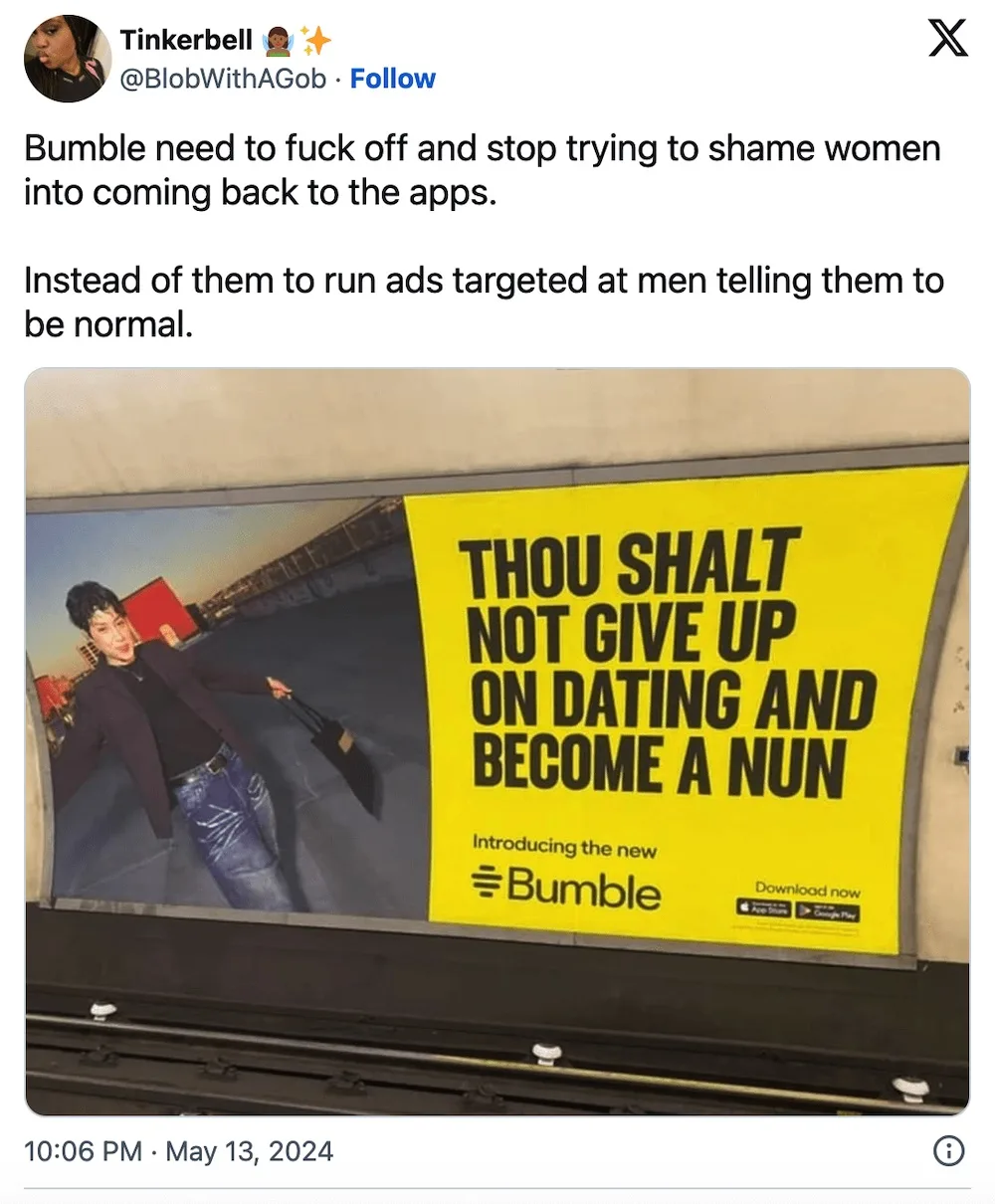
Tesla
- When: 2025-2026
- Why: the toxic influence of an overreaching CEO, perhaps
Now to a second entry for Elon Musk owned companies.
In 2025 overall, Tesla experienced a sizeable decrease in European sales, with figures dropping to just over 235,000 vehicles from the previous year’s 326,000.
That a shocking 28% tumble of around 90,000 cars, resulting in Tesla’s market share falling. In the words of some reports – a total bloodbath. It doesn’t take a Promethean genius to connect this downturn to CEO Elon Musk’s belligerent involvement in European politics, including his vocal support for far-right populist parties – including Germany’s AfD.
While the evidence that a boycott is afoot seems conclusive, it’s not the only signal there’s a consumer backlash against Tesla. The slump appeared as the European market for electric cars grew around 30% in 2025. And in Germany – where Musk has eagerly swaggered into the political debate – they grew even more, by 43%. Tesla’s decline is in diametric opposition to the zeitgeist.
We’re curious to see where this is going to go. But so far it seems that demagoguery and company direction aren’t all that compatible.

Nestle
- When: March 2025
- Why: the DEI rollback
Some of the planet’s biggest firms have been rolling back their diversity, equity, and inclusion (DEI) policies, lately. But, because of boycotts, they won’t always be able to do so without a challenge to their reputations and sales.
As a case in point, Nestlé, the world’s largest food and beverage company, faced a boycott in March 2025 over its perceived DEI rollback. The protest, organized by People’s Union USA, followed similar actions against Amazon, Walmart and Target. Unlike prior boycotts, this one targeted Nestlé’s extensive product range – including pet food, bottled water, baby formula, and chocolate.
The aim is to put pressure on corporations, like Nestlé, to maintain DEI commitments but in this case it was also about emphasising the company’s infamous labor and environmental practices. Allegations of child labor also play a role in the campaign.
Despite the perceived rollback, it should be noted that Nestlé still includes a DEI section on its website and employs a DEI Director on LinkedIn at the time of writing.

Products from the US
- When: 2025-2026
- Why: a mass political protest
Boycotts don’t have to be against single brands – they can be a sweeping protest against the country of origin.
That’s what appears to be happening in Europe, where US goods are getting boycotted because of the political stances of the President. We don’t feel it’s necessary to say his name.
Social media groups supporting a boycott have increased their members rapidly. For instance, Bojkotta varor från USA (translation from Swedish: boycott goods from the US) now has nearly 100,000. As one follower puts it: “Craving KFC? Go for grilled chicken at your neighbourhood restaurant instead”.
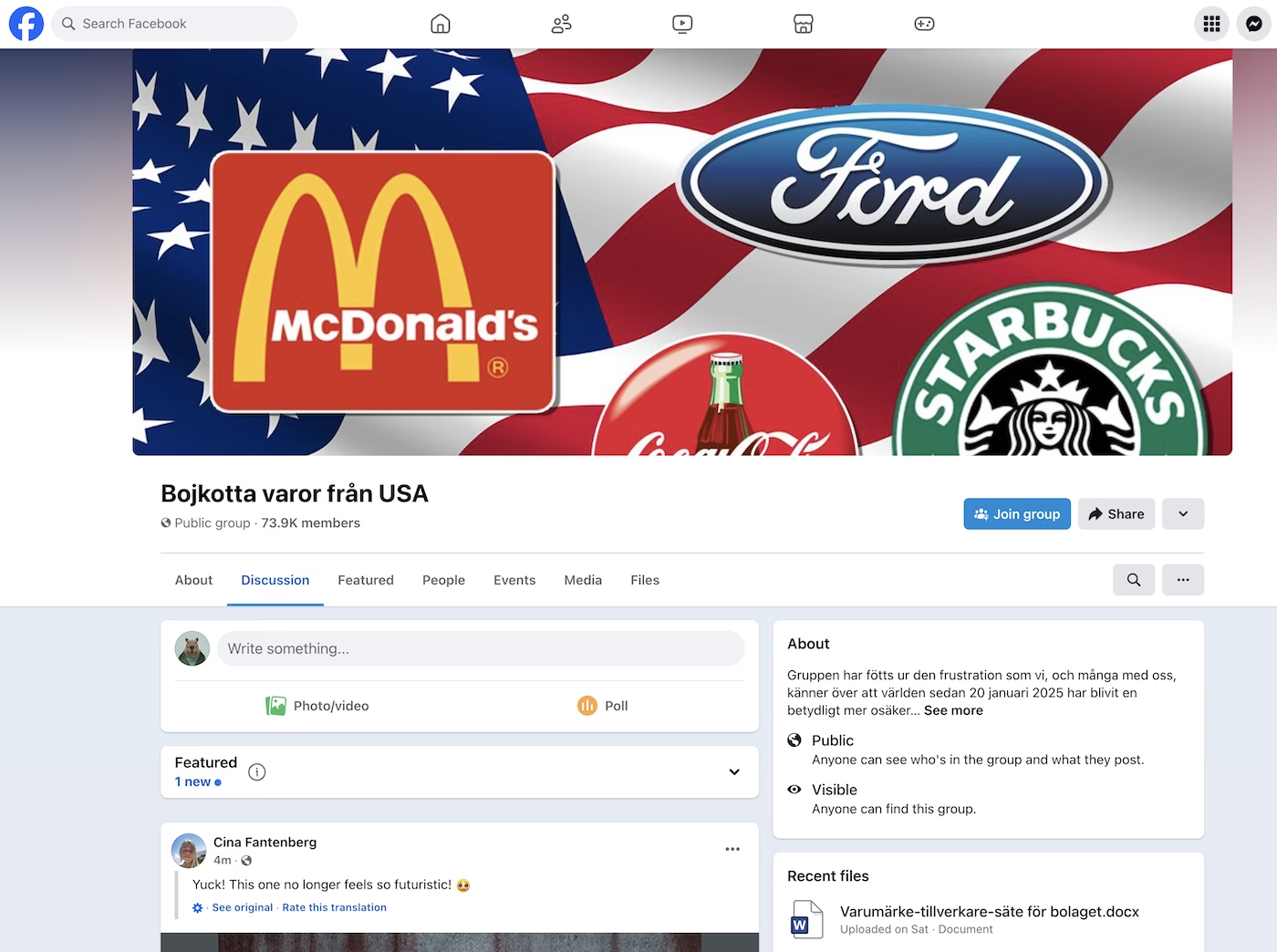
The key issues seem to be the US’s policy towards Ukraine, trade tariffs and – perhaps most worryingly – Greenland. Yet, reports from some countries like France, suggest that a barrier is being able to identify which products are from the US.
It’s a fascinating boycott that is starting to spread and – assuming people are able to accurately identify those US products – could put some pressure on the country’s economy. Then, the leaders who will stand or fall based on the economy’s success. It could become one of the most impactful boycotts of all. We’ve got our eyes on this one and, frankly, we might even join in.
Spotify
- When: 2025-2026
- Why: Investments in the arms industry
We live in a world full of conflicts, which can be fuelled by a network of hidden interests, firms and investments.
As the violence intensifies, an exodus of musicians from Spotify is afoot – in protest against CEO Daniel Ek’s involvement in the defence industry.
in 2025, he is alleged to have invested €600million into firm Helsing, which specializes in ferocious AI battle drones. This hasn’t gone down well with pacifistic artists who are now pulling music from platform. This started with bands at the cult end of the spectrum, with examples including Deerhoof, Xiu Xiu, Hotline TNT and Cindy Lee. But the flight has crossed over into the mainstream and the legendary Massive Attack pulled their music from the platform in late 2025. At Akepa, we might go and see them live anyway, as they’re headlining Barcelona’s Primavera Sound in 2026…
Anyway, one of the most outspoken bands is the excellently named Antipodean outfit King Gizzard and The Lizard Wizard, who make a splendid psychedelic racket. “We just removed our music from the platform. Can we put pressure on these Dr. Evil tech bros to do better?”, is their call to action.

That’s a quote that laconically nails what boycotts are all about: putting pressure on brands to do better. It might not make a huge difference in the end but it’s worth a try in this wild world.
Long story short: ethics matter
For sustainably-driven businesses, being ethical is about showing up for the planet and people in a way that folk believe in and want to support. Ethics build trust and loyalty that stay long after the first transaction.
Shoppers today are looking beyond what’s on the shelf and paying attention to how it got there. If a brand claims to be sustainable but engages in unfair labour practices or has questionable leadership, the backlash can be swift and unforgiving. The rise of social media amplifies these conversations, and one misstep can lead to a viral #Boycott[YourBrandHere] in no time.
After all, a boycott isn’t just bad press. It’s a loud statement that people expect better.



Leave a Reply